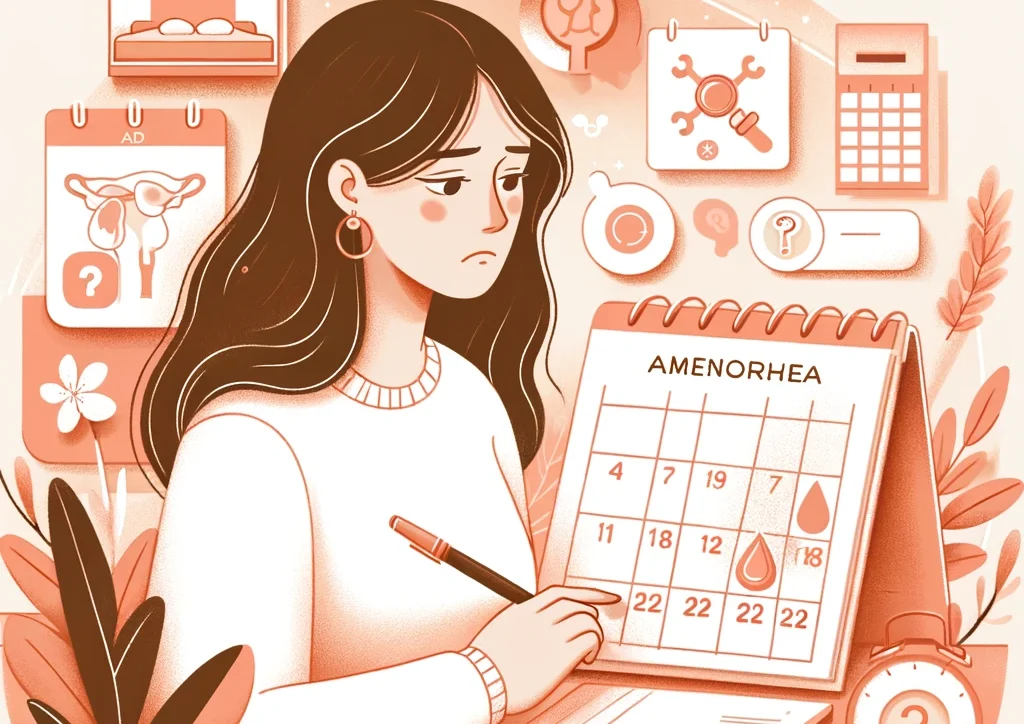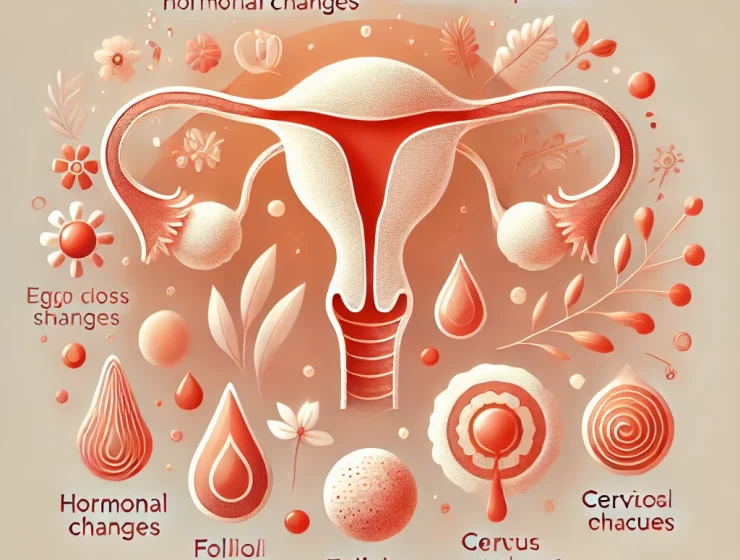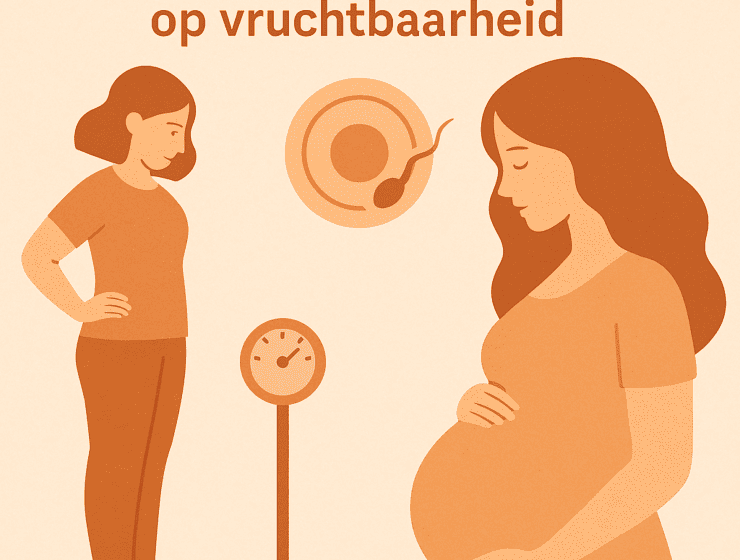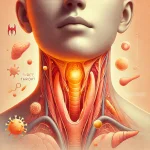Wat is amenorroe precies?
Amenorroe is een medische term die gebruikt wordt om de afwezigheid van menstruatiecycli te beschrijven. Als je als vrouw drie of meer maanden achter elkaar niet menstrueert, spreken we van amenorroe. Dit kan verschillende oorzaken hebben. Soms is het een teken van een onderliggende gezondheidsprobleem, zoals een hormonale disbalans of problemen met de schildklier. Bovendien kan het ook optreden als gevolg van stress, extreem gewichtsverlies of juist een sterke gewichtstoename.
Er zijn verschillende soorten amenorroe:
-
- Primaire amenorroe: Dit betekent dat een meisje van 16 jaar of ouder nog nooit gemenstrueerd heeft.
-
- Secundaire amenorroe: Dit verwijst naar vrouwen die eerder normale menstruatiecycli hadden, maar die nu gedurende drie maanden of langer niet hebben gemenstrueerd.
Hieronder een overzicht van mogelijke oorzaken en symptomen:
| Oorzaken | Symptomen |
|---|---|
| Hormonale onbalans | Onregelmatige of afwezige menstruatie |
| Schildklierproblemen | Vermoeidheid, gewichtstoename |
| Stress | Slaapproblemen, angstgevoelens |
Veelvoorkomende oorzaken van uitblijvende menstruaties
Het uitblijven van de menstruatie, ook wel amenorroe genoemd, kan verschillende oorzaken hebben. Stress is een van de meest voorkomende redenen. Wanneer je gestrest bent, produceert je lichaam het hormoon cortisol, wat je natuurlijke menstruatiecyclus kan verstoren. Zo kan het zijn dat je menstruatie later komt of compleet uitblijft.
Los van stress zijn er nog andere vaak voorkomende oorzaken te noemen. Hier zijn enkele voorbeelden die bij veel vrouwen voorkomen:
-
- Hormoonveranderingen – bijvoorbeeld tijdens de puberteit of menopauze.
-
- Gewichtsveranderingen – zowel gewichtsverlies als gewichtstoename kunnen je cyclus beïnvloeden.
-
- Gezondheidsaandoeningen – ziektes zoals PCOS (Polycysteus Ovariums Syndroom) of schildklierproblemen.
-
- Medicijngebruik – sommige medicijnen, zoals antidepressiva, hebben impact op je menstruatiecyclus.
| Oorzaak | Effect op de Cyclus |
|---|---|
| Stress | Verlate of uitblijvende menstruatie |
| Gewichtsveranderingen | Ongeregelde menstruatie |
Hoe stress en levensstijl je cyclus beïnvloeden
Wanneer stress en levensstijl een belangrijke rol spelen in je leven, kan dit een aanzienlijke invloed hebben op je menstruatiecyclus. Stress kan leiden tot veranderingen in de hormoonbalans, wat het natuurlijke ritme van je cyclus kan verstoren. Dit kan resulteren in ovulatiestoornissen en door stress veroorzaakte amenorroe, waarbij je menstruatie volledig uitblijft. Bovendien zijn er ook andere levensstijlfactoren die je cyclus kunnen beïnvloeden, zoals extreme diëten of overmatig sporten. Het lichaam beschouwt deze situaties als stressvol, wat kan leiden tot vergelijkbare hormonale verstoringen.
Andere levensstijlfactoren die een rol spelen:
-
- Onregelmatige eetpatronen: Onvoldoende calorie-inname of vasten kan invloed hebben op je hormonale balans.
-
- Lichaamsgewicht: Zowel overdreven gewichtstoename als gewichtsverlies kunnen je menstruatiecyclus verstoren.
-
- Slaaptekort: Een gebrek aan voldoende slaap kan je hormonen uit balans brengen.
Als je leven vol stress en slechte gewoonten is, dan is het niet verrassend dat je menstruatiecyclus ongeregeld raakt. Het aanpassen van je levensstijl kan enorm helpen om je cyclus te reguleren en amenorroe te voorkomen.
| Factor | Effect op Cyclus |
|---|---|
| Stress | Ovulatiestoornissen |
| Dieet | Hormoonverstoringen |
| Slaaptekort | Onregelmatige cycli |
Wanneer naar de dokter gaan bij amenorroe
Een bezoek aan de dokter kan noodzakelijk zijn als je te maken hebt met amenorroe. Amenorroe, ofwel het uitblijven van de menstruatie, kan veroorzaakt worden door verschillende factoren. Het is belangrijk om te herkennen wanneer het verstandig is om medische hulp in te schakelen. Allereerst, als je gedurende drie opeenvolgende cycli of langer geen menstruatie hebt gehad, is het raadzaam om een afspraak te maken met je huisarts of verloskundige. Dit kan wijzen op onderliggende gezondheidsproblemen die nader onderzoek vereisen.
-
- Plotseling gewichtsverlies of overmatige stress
-
- Een historie van hormonale onbalans
-
- Pijn in de onderbuik of andere ongewone symptomen
Zoek ook medische hulp als je symptomen hebt die wijzen op gezondheidsproblemen zoals warmteopwellingen, nachtelijk zweten of onverklaarbare gewichtstoename. Een arts kan verschillende tests uitvoeren, zoals bloedonderzoek of een echografie, om de oorzaak van je amenorroe vast te stellen.
| Symptoom | Wanneer naar de dokter |
|---|---|
| Geen menstruatie voor 3+ maanden | Direct |
| Ernstige buikpijn | Onmiddellijk |
| Onverklaarbare gewichtstoename | Snel |
Praktische tips om je menstruatiecyclus te verbeteren
| Tip | Actie |
|---|---|
| Voeding | Gezond en gevarieerd eten |
| Stressmanagement | Ontspanningsoefeningen, meditatie |
| Lichaamsbeweging | Yoga, wandelen, matige cardio |
| Supplementen | Vitamine D, magnesium |
Samenvatting
Als je tot hier hebt gelezen, dan weet je nu een stuk meer over amenorroe en waarom je menstruatie kan uitblijven. Het is belangrijk om te beseffen dat er veel verschillende oorzaken kunnen zijn, van hormonale disbalans tot stress en medische aandoeningen. Onze missie bij Verloskundigen PuurBegin is om jou goed te informeren en te begeleiden, zodat je de beste zorg en aandacht krijgt die je verdient.
Heb je vragen of wil je graag een afspraak maken om je situatie te bespreken? Wij staan voor je klaar! Neem gerust contact met ons op, zodat we samen kunnen kijken naar de beste oplossingen en welke vervolgstappen je eventueel kunt nemen.
Vergeet niet om goed voor jezelf te zorgen en naar je lichaam te luisteren. Tot snel bij Verloskundigen PuurBegin!
Blijf op de hoogte!
Volg ons op social media voor het laatste nieuws en een kijkje achter de schermen bij Verloskundigen PuurBegin in Kampen.
Ontdek de dagelijkse avonturen van onze verloskundigen, waardevolle tips voor aanstaande ouders en inspirerende verhalen uit de praktijk.
Klik op de onderstaande knoppen en blijf verbonden met ons hartverwarmende team!
 |
 |
Hartelijke groet,
Verloskundigen PuurBegin
Adres: Orkestlaan 148, 8265RC Kampen
Telefoon: 085 40 19 095








